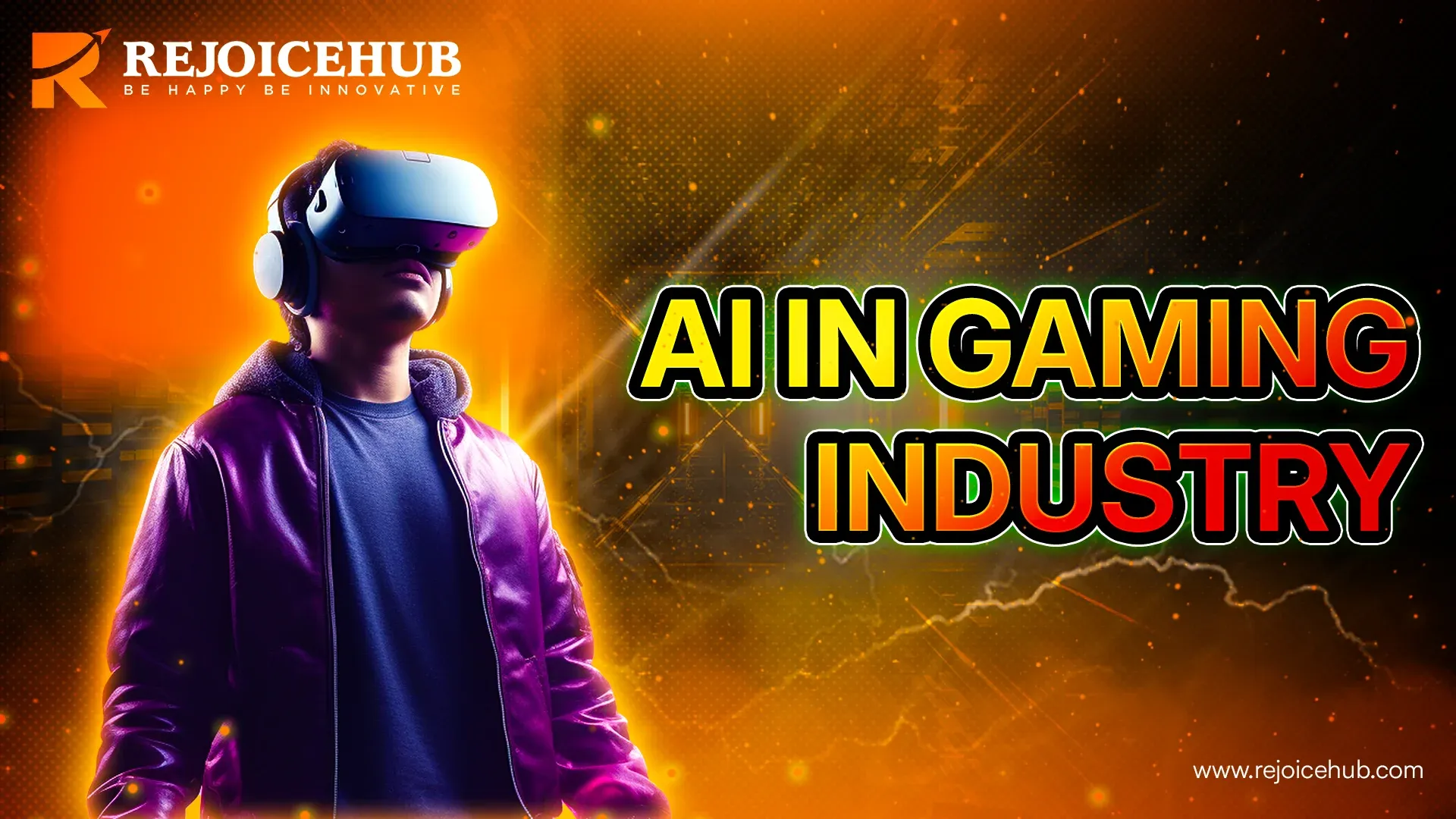
Your favorite game characters seem to think on their own?
Games adapt to your playstyle?
That is what AI in gaming is. In this artificial intelligence breathes life into virtual worlds. It creates immersive and dynamic experiences.
Think of playing a game where the non-player characters (NPCs) follow scripted paths and react intelligently to your actions.
AI in gaming refers to the use of artificial intelligence technologies. It is to create responsive, adaptive and intelligent behaviors in games. Their key applications include autonomous NPCs, procedural content generation and personalized gaming experiences. The popular AI games include AI Dungeon, Screeps and the FIFA series.
The future of AI in gaming industry claims experiences that is more immersive and intelligent gaming.
Quick Summary
In this blog, we will explore artificial intelligence in video games. It is transforming the way gaming used to be. It enhances gameplay and streamlines development. AI has become the heart of modern gaming.
What is AI in Gaming?
AI in gaming involves the integration of artificial intelligence techniques into video games. It is to create more realistic and engaging experiences. This includes programming NPCs to exhibit intelligent behaviors. It generates dynamic game content and personalizes gameplay based on player integrations.
How AI is used in Gaming
AI in gaming enhances player experiences by enabling smarter NPC behavior, dynamic environments, and adaptive difficulty levels. It’s used in game design, character animation, and even procedural content generation, making games more immersive and personalized.
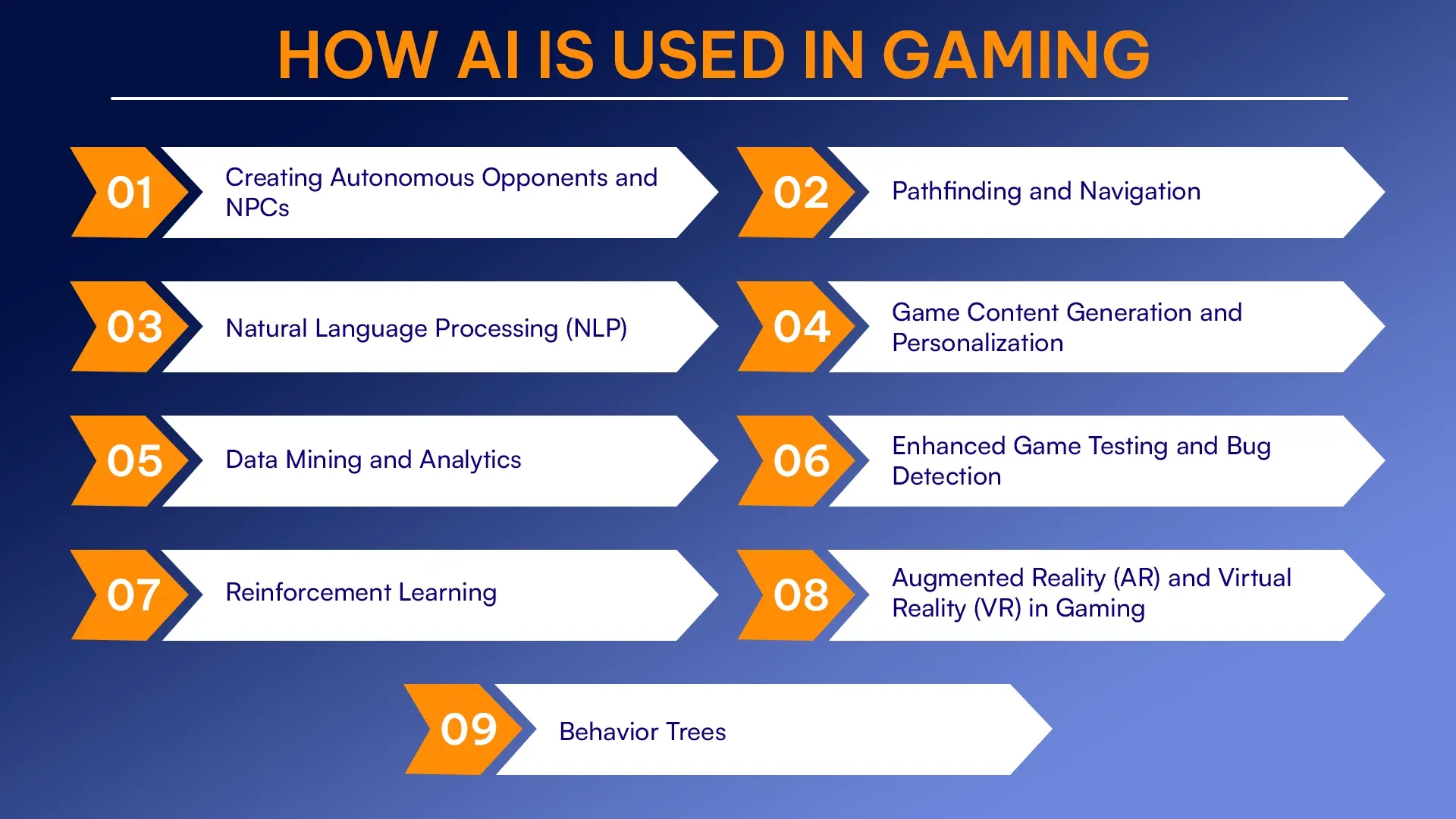
1. Creating autonomous opponents and NPCs
AI helps game characters act intelligently. It adapts to the player’s moves and offers realistic challenges to create an engaging and lifelike experience of gaming.
2. Pathfinding and Navigation
AI guides characters through game maps. This helps them avoid obstacles and take shortcuts. It moves naturally in the game world.
3. Natural language processing (NLP)
NLP allows games to understand player’s spoken or written commands. This makes conversations with characters and storylines more interactive and realistic.
4. Game content generation
AI customizes game levels and puzzles. It even customizes challenges by making sure that the game matches each player’s skill level and personal choices for a better experience.
5. Data mining and Analytics
AI studies how players interact with games. This improves game designs. It adjusts difficulty levels and personalizes features for an enjoyable experience.
6. Enhanced game testing and bug detection
AI tests games by playing them automatically. It detects glitches and issues. That also faster and more efficiently than human testers could do.
7. Reinforcement learning
AI learns games through trials and errors. This improves their strategies over time. This makes gameplay more challenging and rewarding for players.
8. Augmented reality (AR) and Virtual reality (VR) in gaming
AI creates immersive virtual worlds. It adapts to the actions of players. This improves the realism and interaction in AR and VR games.
9. Behavior trees
AI uses a system called behavior trees. This system is to help game characters. That makes decisions and behaves in a lifelike. It has logical manner during gameplay.
Also Read: Role and Benefits of Artificial Intelligence in Education
Types of AI in Games
Artificial Intelligence in games enhances player experience by creating smart, responsive, and engaging gameplay. Common types include pathfinding AI for character movement, decision-making AI for NPC behavior, procedural generation AI for dynamic content, and adaptive AI that adjusts difficulty based on player skill. These AI systems make games more immersive, challenging, and fun.
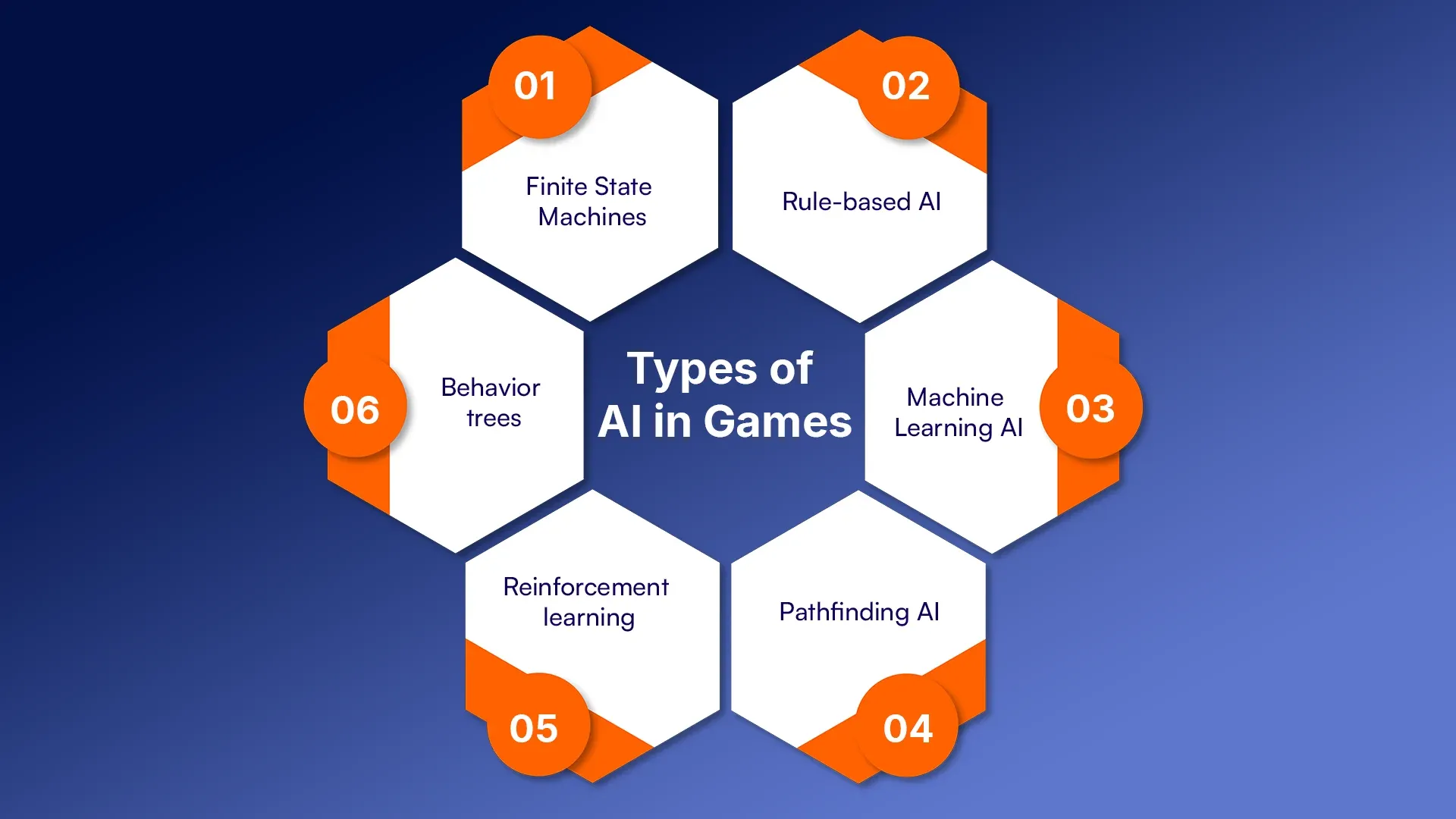
1. Finite state machine
Characters follow predetermined behaviors. Those behaviors are like ‘idle’ or ‘attack’. It transitions between states based on triggers. It is simple, efficient and works well for predictable and structured gameplay scenarios.
2. Rule based AI
Characters act according to predefined rules. Those rules are like ‘if attacked, defend.’ These actions are fixed and straightforward. This makes them easy to implement. But it makes them less adaptable to unexpected situations.
3. Machine learning AI
AI learns from player data by gaining knowledge. It makes smarter decisions by gaining knowledge. It adapts to different gameplay styles. It offers personalized gaming experiences by evolving.
4. Pathfinding AI
It determines efficient movement paths. It is for characters. This avoids obstacles and selects shortcuts to navigate game environment smoothly. It ensures realistic and logical navigation within the game world.
5. Reinforcement learning
AI improves decision making. This is done by trial and error. It rewards good actions and penalizes mistakes. It optimizes strategies over time by offering adaptive gameplay challenges.
6. Behavior trees
AI organizes actions hierarchically. It allows characters to make complex decisions. This ensures logical and lifelike responses in different situations. It enhances immersion and realism during gameplay.
What are the benefits of AI in Games?
AI in games offers benefits like realistic NPC behavior, personalized gameplay, improved game design efficiency, and adaptive difficulty. It also enables smarter decision-making and creates more engaging, immersive experiences for players.
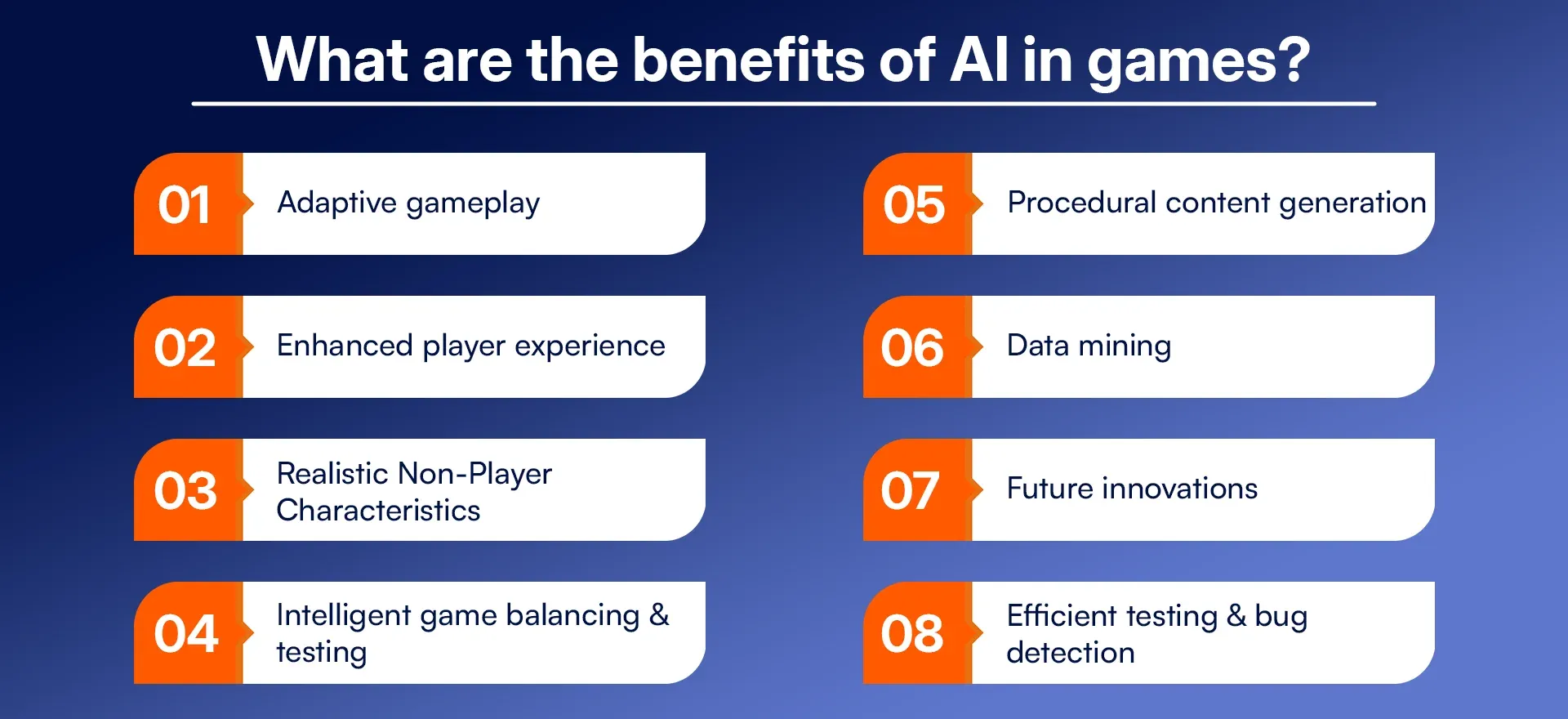
1. Adaptive gameplay
AI changes difficulty levels and game scenarios. It is based on how well players perform. This makes gaming experience fun and challenging. It is suited to individual’s skill levels.
2. Enhanced player experience
Smart AI characters and customized content make gaming more interactive and immersive. It even makes it enjoyable by responding to the actions and preferences of players.
3. Realistic non player characteristics
AI helps NPCs in acting and responding like real people or creatures. This makes the game feel more realistic. Along with that it makes it believable for players.
4. Intelligent game balancing and testing
AI evaluates gameplay mechanism and removes errors. It is done by making sure that the games are fair, enjoyable and work smoothly without glitches.
5. Procedural content generation
AI generates random, creative game levels, puzzles or quests. It gives players something new every time. It increases the game’s play value.
6. Data mining
AI looks and checks how players interact with games. It helps developers improve designs, balance features and create better targeted marketing strategies.
7. Future innovations
AI leads advancements. Those advancements include games that build themselves new game formats and autonomous systems. It transforms how games are designed and played.
8. Efficient testing and bug detection
AI automates game testing by finding issues quickly. It speeds up development while lowering costs and improving game stability.
Also Read: A in Agriculture | Use Case, Benefits, and More
What are the most popular AI Games?
Popular AI games like The Last of Us, Red Dead Redemption 2, and Middle-earth: Shadow of Mordor showcase advanced AI with lifelike NPCs and adaptive enemy behaviors. Games like AI Dungeon and Minecraft with AI mods push boundaries by offering dynamic storytelling and creative gameplay through AI integration.
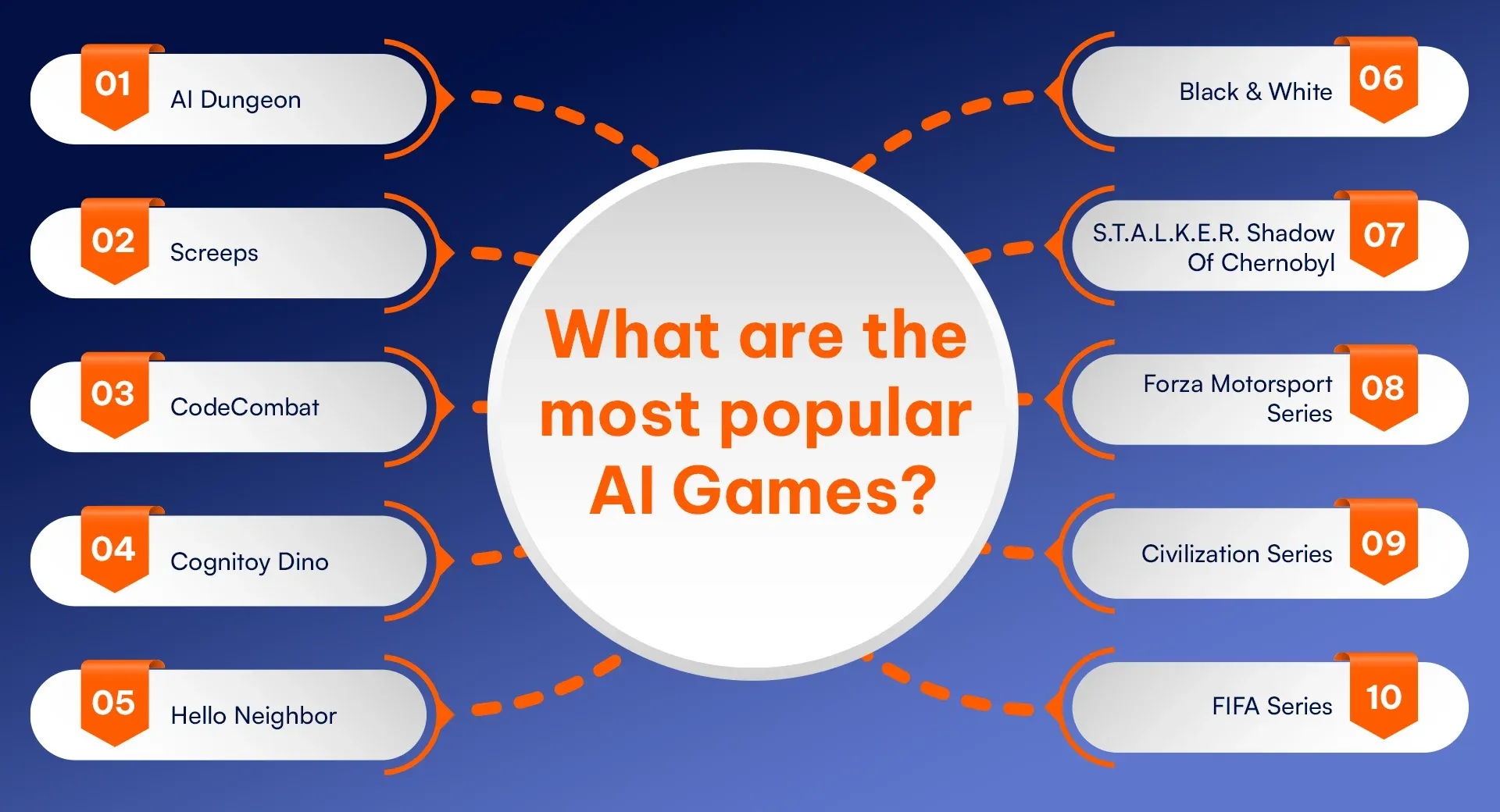
1. AI Dungeon
It is a text-based adventure game. In this AI generates unique storylines based on player inputs. It offers endless creativity and personalization with immersive storytelling every time you play.
2. Screeps
It is a strategy game designed for programmers where players write code to control units in a persistent world. It teaches code in a fun and interactive gameplay environment.
3. CodeCombat
It is an educational game. It makes coding easy by incorporating programming challenges directly into a gameplay. It helps players learn real life coding skills.
4. Cognitoy Dino
It is a smart AI toy dinosaur. It interacts with children by customized conversations. It is based on their input. It encourages creativity and learning through fun dialogue.
5. Hello Neighbor
It is a sleath based horror game. It features an adaptive AI opponent who learns and counters the player’s strategies. It creates dynamic and thrilling gameplay.
6. Black & White
Black & White is a god simulation game where your creature learns from your actions using AI, adapting its behavior to reflect your good or evil choices.
7. S.T.A.L.K.E.R. Shadow of Chernobyl
It is a survival game with intelligent and unpredictable enemies. It has a dynamic environment. This game offers a realistic and ever-changing experience set in a post-apocalyptic world.
8. Forza Motorsport Series
This series includes racing games. In these games, AI mimics human driving behavior. It creates competitive and lifelike opponents for an authentic racing experience.
9. Civilization Series
This series includes strategy games. In these games, AI control rival civilization, learning and adapting strategies. It is to challenge players in political, military and diplomatic scenarios.
10. FIFA Series
This series includes sports games. In these games, AI players are modeled to act and perform like real world athletes. This creates immersive and lifelike football matches.
Future of AI in Gaming Industry
AI will make more personalized and immersive gaming experiences. It adapts the player’s actions and preferences. The redefined game is done by enhanced NPC behavior, realistic environments and storytelling. AI tools will speed up development, automate testing and optimize game balance. Innovations like autonomous game creation promise limitless possibilities. It is for players and developers.
We can anticipate:
- More intelligent NPCs because NPCs can understand context, emotions and player’s intentions.
- Procedural storytelling because AI generated narratives adapts to player’s choices.
- Autonomous game development because AI tools assist in designing and developing games.
- Enhanced AR and VR experiences because AI virtual environments respond to players.
- Improved accessibility because AI features make games more accessible to players with disabilities.
Conclusion
AI offers unprecedented levels of immersion, personalization, and innovation. Artificial intelligence in video games enhances gameplay and streamlines the development process, making it an invaluable asset in the gaming industry. The possibilities of AI-driven gaming experiences are limitless. RejoiceHub LLP harnesses the power of AI to create next-gen gaming solutions, delivering cutting-edge experiences through advanced AI services.
Frequently Asked Questions
What is AI in gaming?
AI in gaming refers to the use of artificial intelligence technologies. It is to create intelligent behaviors in games.
How does AI enhance gameplay?
AI enhances gameplay by creating responsive game elements.
Can AI create entire games?
AI can assist in game development. Creating an entire game is still a developing area. It is an ongoing research and experiment.
What are the examples of AI in gaming?
AI Dungeon, Screeps and the FIFA series.
